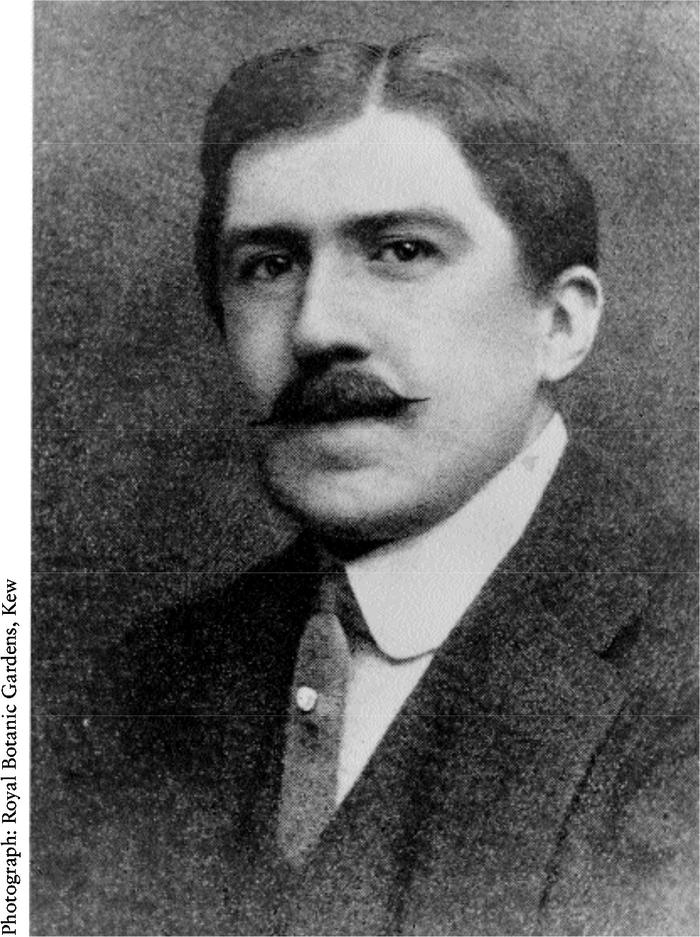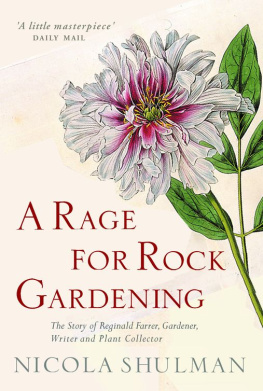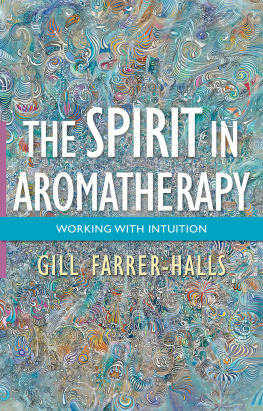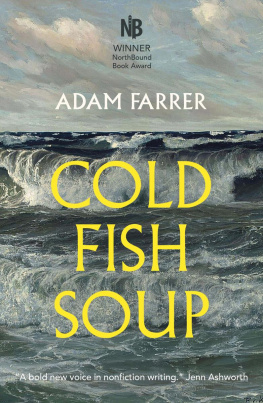As good as biography gets: pithy, funny, touching, never less than captivating
C RESSIDA C ONNOLLY, V OGUE
Shulman has seen in her epicene, dwarfish subject some ineffable quality that reaches beyond rock gardens and touches the universal no small achievement.
S ARA W HEELER, S ATURDAY T ELEGRAPH M AGAZINE
Writing with wit and enviable clarity, Ms Shulman has created a brilliant brief life of Reginald Farrer.
A NNA P AVORD, L ONDON E VENING S TANDARD
This biography, only 128 pages long, is as satisfying as a biography five times its size.
L UCY L ETHBRIDGE, T HE T ABLET
Reginald Farrer is, as Nicola Shulman testifies, oddly irresistible
C AROLINE M OORE, S UNDAY T ELEGRAPH
A book which in a few elegant and perceptive chapters immediately illuminates Farrers whole life.
P ENELOPE H OBHOUSE, S PECTATOR
An unforgettable biography, beautifully written in a wry, rather old-fashioned manner, full of comedy and, finally, tragedy and one which can be read at a single sitting A real treat.
L ESLIE G EDDES B ROWN, C OUNTRY L IFE
A miniature miracle of compression, a triumph of decisive style, a cabinet of learning lightly and subtly displayed.
I AIN F INLAYSON, T IMES
All gardeners should read this book
R OY L ANCASTER
A gripping read.
T HE B OOKSELLER
For Constantine
Dear, I know nothing of Either, but when I try to imagine a faultless love Or the life to come, what I hear is the murmur Of underground streams, what I see is a limestone landscape.
In Praise of Limestone, W.H. Auden

B alliol College, Oxford, 1899. Benjamin Jowett, the reforming Master of the college, was six years dead. Under him, it had changed from an essentially religious institution, supplying curates to the cloth, into a sort of arsenal for the Empire, specialising in the manufacture of political and civic giants: viceroys, archbishops, cabinet ministers were now manoeuvred out of its gates and into their appointments in the key positions of power. After him, there came a generation of undergraduates with quite different intentions. Although these were mostly born in 1880, it could be said of them that they were the first to manifest that distinctly post-Victorian quality, an antipathy to growing up. Notions of duty and worldly ambition repelled them somewhat. They were venturesome: for them, the memorable undergraduates of the day were not the ones with their noses aimed at the cabinet, but those on whom the greatest gifts of nature and fortune sat most lightly.
Two figures emerge to refine the type: Aubrey Herbert and Raymond Asquith. They were creatures of extraordinary mystique, whose well-bred ease, by its nature unattainable through effort, inspired in their peers a hero-worship that long outlasted the age of impressionability. As an old man, the memoirist Lawrence Jones recalled his first meeting with Asquith:
A most vivid picture of my freshman days is the sudden appearance in my rooms, one winters night, of a new face, framed in the upturned collar of a fur coat, the most beautiful, subtle and distinguished young mans countenance that I had ever set eyes upon.
Asquiths beauty was his least advantage. The Regius Professor of Greek took off his hat to him if they passed in the street. He also was witty, cool, discriminating; the dazzle of his urbanity was discernible from yards away, amazing to provincial eyes. He acknowledged his gifts for the pleasure they brought him, but largely despised the worldly success they could procure, in politics or in commerce. As the son of H.H. Asquith, the coming man of the Liberal party, he was held to know what he was talking about, and his posture was widely adopted by his contemporaries, to whom it conveyed no whiff of reaction, but freedom and self-determination.
The case of Herbert, the son of the Earl of Carnarvon, is less straightforward. Later he would be a hero of the Gallipoli campaign and twice refuse the throne of Albania; now he was a dishevelled boy, half-blind, not altogether beautiful; and yet he had personal magnetism that produced in the susceptible a more intoxicated response than the admiration that was due to his friend. To judge from accounts, susceptibility to his charm was general but in some, like John Buchan, who later wrote Greenmantle about him, it turned into something like love.
In memoirs where Asquith and Herbert are featured together, there sometimes appears, very much lower down on the programme, the name of Reginald Farrer. He was also at Balliol, but he had not come in on such a good ticket. If it had been his face peeping out from the fur collar on that winters night, it would have left Jones with an altogether different memory for his scrapbook . For a start, he would have had to take a step back and look down, because Farrer was short, almost to dwarfishness. He had his mothers heaviness, and a face like proving dough, with dark hair growing from a low forehead and a hare-lip that took refuge behind a moustache as yet too weak in growth to disguise it. Like many ugly people he had nice eyes: dark, and shining, according to his younger cousin Osbert Sitwell, with a particular and urgent light that is only to be noticed in the eyes of the deaf, or in those who experience some physical difficulty in utterance. Sitwell mischievously claimed to find this unaccountable, as the Farrer he knew had no hesitation in speaking. He meant to imply that the problem was, if anything, the reverse.
But it can be accounted for. Farrers hare-lip was the external symptom of a worse affliction. He had been born with a cleft palate. In early childhood several operations were performed upon the little boy by physicians who still half-believed that the condition was caused by maternal frights (and indeed Farrers pregnant mother had been surprised by a chimney sweep). The standard procedures involved hot tongs, sulphuric acid and metal bridles; but in spite of them he could not speak intelligibly, and until he was fifteen the only person who could properly understand him was his mother.
The consequences of this defect on his life and personality are hard to enumerate, but three at least are obvious. Firstly, the pain and tedium of his childhood taught him to endure physical hardship, and his own hardly-won toughness gave him a lifelong intolerance of frailty in himself or others. Secondly, he was left with the characteristic speaking voice of cleft palate: a shallow bugling screech, like wind through cracked metal. According to a contemporary treatise on cleft palate, It is scarcely possible to estimate the number of adults who are practically excluded from society by this distressing deformity, for this often resulted in a refusal to speak at all. Lastly, his condition prevented him from going to school, and so he enjoyed a great deal more home life than was usual for a boy of his type.
Farrer was born in London, but home was the family estate, at Clapham in North Yorkshire, to which he was heir. The Ingleborough Estate, for so it is called, was acquired for its shooting in the late eighteenth century, with money earned from the successful family law firm and perceptively invested. Its purchase was the first step in a process wherein the Farrers, or this branch at least, turned from lawyers to the Crown, and indeed to everybody or any institution of consequence to gentlemen, thereby exchanging their position of unique power in Britain to one of moderate influence in the Skipton area. This was viewed by all as an advance.
By the time Reginald was born the process was complete. His father, James Anson Farrer, was indisputably a gentleman: he had a large estate, was high sheriff of Yorkshire, had several times been Liberal MP for Skipton and was a prolific writer of books that nobody read. If he was a remote figure in his older sons early life, the slack was taken up by his wife, Bessie, who set then a standard of interest and attention that may later have led to unreasonable expectations. Reginalds mother was a woman of few but fervent interests, and her chief love was the Church. Many are the plaques in Clapham church commemorating her acts of largesse, which included, though there is no plaque for this, the provision of a meek and attentive congregation from the ranks of her husbands tenantry.






